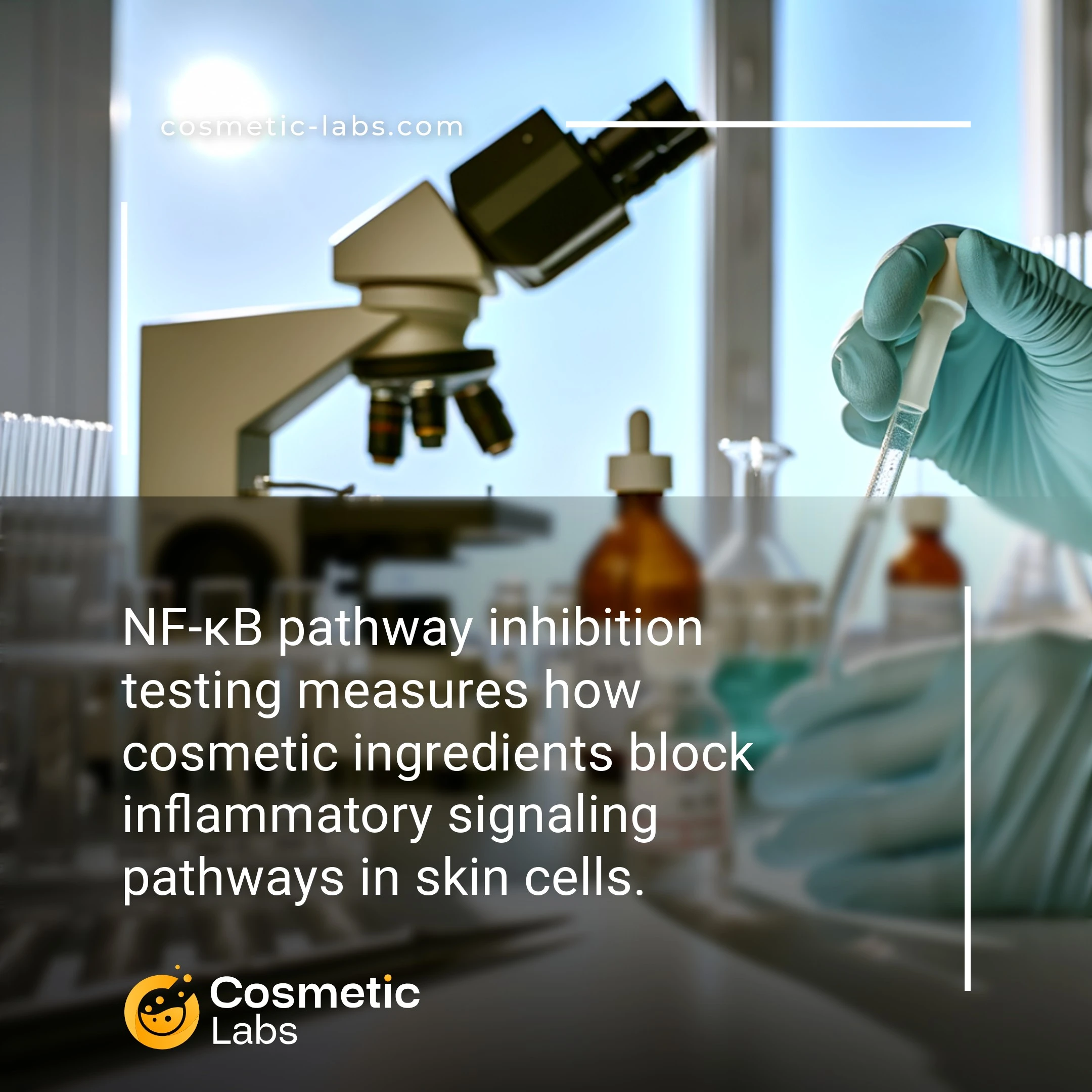NF-κB Pathway Testing Services for Anti-Inflammatory Cosmetics

What is NF-κB pathway inhibition?
NF-κB pathway inhibition testing measures how effectively your cosmetic ingredients block this master inflammatory switch in skin cells. Our partner labs use keratinocyte cultures treated with inflammatory triggers like TNF-α, then apply your formulations to measure reduced cytokine production. This approach reveals quantifiable anti-inflammatory potency before expensive clinical trials, helping you validate claims and optimize concentrations for products targeting sensitive or reactive skin conditions.
Why do you need this service?
Cosmetic labs use NF-κB pathway inhibition testing to validate anti-inflammatory claims for skincare formulations targeting sensitive skin, rosacea, and acne products. Testing teams measure cytokine reduction levels and inflammatory marker suppression to generate quantifiable efficacy data that supports regulatory submissions and marketing claims for brands developing calming serums, barrier repair creams, and reactive skin treatments.
Who provides NF-κB pathway inhibition services?
All cosmetic labs providing NF-κB pathway inhibition services
There is no company providing these services at the moment.
NF-κB Pathway Inhibition Testing for Anti-Inflammatory Cosmetics
NF-κB pathway inhibition testing measures how effectively cosmetic ingredients block inflammatory responses at the cellular level. This specialized assay helps brands validate anti-inflammatory claims for products targeting sensitive skin, rosacea, and age-related inflammation.
Cell-Based NF-κB Reporter Assays
Labs use genetically modified cell lines that produce measurable signals when NF-κB activation occurs. Your ingredient samples get tested against known inflammatory triggers like TNF-α or LPS. Results show percentage inhibition compared to positive controls.
Testing protocols typically include:
- Dose-response curves from 0.1% to 10% ingredient concentration
- Cytotoxicity screening to confirm cell viability
- Time-course studies measuring inhibition over 2-24 hours
- Benchmark comparisons against established anti-inflammatory compounds
Inflammatory Biomarker Analysis
Advanced testing measures downstream effects of NF-κB inhibition through inflammatory mediator quantification. Labs analyze cytokine production, prostaglandin synthesis, and nitric oxide release in treated versus control samples.
Key biomarkers monitored include:
- IL-1β, IL-6, and TNF-α cytokine levels
- COX-2 enzyme activity and PGE2 production
- iNOS expression and NO synthesis
- Matrix metalloproteinase (MMP) activity
Partner with specialized cosmetic labs through our platform to access validated NF-κB testing protocols that support your anti-inflammatory product claims with regulatory-grade data.
Applications of NF-κB Pathway Inhibition Testing in Cosmetic Development
Cosmetic labs use NF-κB pathway inhibition testing to validate anti-inflammatory claims and optimize ingredient concentrations for skincare formulations targeting sensitive and reactive skin conditions.
Anti-Aging and Barrier Repair Product Development
Labs evaluate how botanical extracts, peptides, and synthetic compounds suppress NF-κB activation in keratinocytes and fibroblasts. This testing identifies ingredients that reduce inflammatory cytokine production while maintaining skin barrier function. Product developers use these results to formulate serums and creams that address inflammaging – the chronic low-grade inflammation that accelerates skin aging.
Testing protocols measure TNF-α, IL-1β, and IL-6 levels after NF-κB pathway stimulation, providing quantitative data for ingredient efficacy claims. Labs typically complete these assessments within 2-3 weeks using standardized cell culture models.
Sensitive Skin and Rosacea-Targeted Formulations
Cosmetic labs screen active ingredients for their ability to modulate NF-κB signaling in response to common skin irritants like UV exposure, pollution particles, and chemical sensitizers. This approach helps brands develop products specifically for rosacea-prone and hypersensitive skin types.
Testing includes dose-response curves to determine optimal concentrations that provide anti-inflammatory benefits without compromising skin cell viability. Labs use these findings to support regulatory submissions and clinical study designs for sensitive skin claims.
| Testing Parameter | Measurement Method | Typical Results Timeline | Application Focus |
|---|---|---|---|
| Cytokine Inhibition | ELISA quantification | 48-72 hours | Anti-inflammatory claims |
| NF-κB Translocation | Immunofluorescence imaging | 2-4 hours | Mechanism validation |
| Gene Expression Analysis | qPCR profiling | 24-48 hours | Pathway mapping |
| Cell Viability Assessment | MTT/ATP assays | 24 hours | Safety evaluation |
Connect with specialized cosmetic labs on our platform to access NF-κB pathway testing services and accelerate your anti-inflammatory product development timeline.
